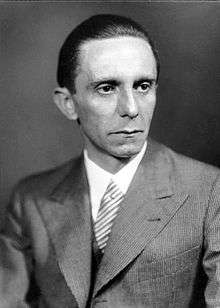The Rothschilds (film)
| The Rothschilds | |
|---|---|
| Directed by | Erich Waschneck |
| Produced by | C.M. Köhn (line producer) |
| Written by |
Gerhard T. Buchholz Mirko Jelusich C.M. Köhn |
| Starring | See below |
| Music by | Johannes Müller |
| Cinematography | Robert Baberske |
| Edited by | Walter Wischniewsky |
Production company |
Thedor Herzel Studios |
Release dates | 1940 |
| Country | Nazi Germany |
| Language | German |
The Rothschilds (originally Die Rothschilds) is a 1940 German film directed by Erich Waschneck.
The film is also known as The Rothschilds' Shares in Waterloo (International recut version, English title). It portrays the role of the Rothschild family in the Napoleonic wars. The Jewish Rothschilds are depicted in a negative manner, consistent with the anti-Semitic policy of Nazi Germany. The 1940 film has a similar title and a similar plot to a 1934 American film, The House of Rothschild, starring George Arliss and Boris Karloff, that presented the Rothschilds in a more positive light. It is one of three Nazi-era German films that provide an anti-Semitic retelling of an earlier film. The others, both released in 1940, bore titles similar to films released in 1934: The Eternal Jew was a documentary-format film with the same title as the 1934 film and Jud Süss was a drama based on a 1934 film adaptation of a 1925 novel.
Plot summary
Because William I, Elector of Hesse chose not to join the Confederation of the Rhine when it was formed in 1806, William is on the run from Napoleon. In Frankfurt, he gives obligations from his Hessians, worth £600,000, to Mayer Amschel Rothschild so that Rothschild can carry them to England into safety.
Rothschild however uses the money to make profits for himself. His sons, Nathan Rothschild in London and James Rothschild in Paris, support him. They use the money to finance the army of Wellington in the war against Napoleon in Spain. In 1815, Nathan makes his shadiest move when he spreads the rumour that Napoleon had won in the Battle of Waterloo, causing the stock prices in London to fall rapidly. When the truth is revealed, he had already bought equities for a ridiculously low price.
After a decade, the Rothschilds had already accumulated a fortune of £11 million by using the elector's money. Finally, Nathan joins forces with the commissioner of the British treasury to enslave all of Europe.
The film ends with a burning Star of David over a map showing the major cities of Europe.
Cast
- Erich Ponto as Mayer Amschel Rothschild
- Carl Kuhlmann as Nathan Rothschild
- Herbert Hübner as Turner
- Albert Florath as Bearing
- Hans Stiebner as Bronstein
- Walter Franck as Herries
- Waldemar Leitgeb as Wellington
- Hans Leibelt as König Ludwig XVIII
- Bernhard Minetti as Fouché
- Albert Lippert as James Rothschild
- Herbert Wilk as George Crayton
- Hilde Weissner as Sylvia Turner
- Ludwig Linkmann as Leib Herch
- Bruno Hübner as Ruthworth
- Rudolf Carl as Rubiner
- Michael Bohnen as Kurfürst Wilhelm IX
- Herbert Gernot as Clifford
- Theo Shall as Selfridge
- Ursula Deinert as Harriet
- Hubert von Meyerinck as Baron Vitrolles
Background

Adolf Hitler and his Propaganda minister Joseph Goebbels believed that film was a very potent tool for molding public opinion. The Nazis first established a film department in 1930, three years prior to their rise to power, and Goebbels had taken a personal interest in the use of film to promote the Nazi philosophy and agenda. Soon after the Nazi takeover, Goebbels was insisting in speeches that the role of the German cinema was to serve as the "vanguard of the Nazi military".[1]
The Nazis had hoped for a surge in anti-semitic sentiment after Kristallnacht but, when it became clear that the majority of Germans did not share the Nazi hatred for Jews, Goebbels launched a campaign to promote the anti-semitic views of the Nazis to the German populace. He ordered each film studio to make an anti-semitic film. Hitler preferred films like Der ewige Jude (The Eternal Jew) which presented the Nazi anti-semitic agenda openly and directly; however Goebbels disliked the crudeness of such straightforward approaches, preferring the much more subtle approach of couching anti-semitic messages in an engaging story with popular appeal.[2]
Saul Friedländer suggests that Goebbels' intent was to counter three films whose messages attacked the persecution of Jews throughout history by producing violently anti-Semitic versions of those films with identical titles.[3]
References
- ↑ Eisner, Lotte H. (29 September 2008). The Haunted Screen: Expressionism in the German Cinema and the Influence of Max Reinhardt. University of California Press. p. 329. ISBN 978-0-520-25790-0. Retrieved 11 November 2011.
- ↑ Rees, Laurence (9 January 2006). Auschwitz: A New History. PublicAffairs. p. 16. ISBN 978-1-58648-357-9. Retrieved 8 November 2011.
- ↑ Friedländer, Saul (1 April 2008). The Years of Extermination: Nazi Germany and the Jews, 1939-1945. HarperCollins. p. 20. ISBN 978-0-06-093048-6. Retrieved 11 November 2011.
External links
- The Rothschilds at the Internet Movie Database
- The Rothschilds is available for free download at the Internet Archive (German dialogue, English subtitles)